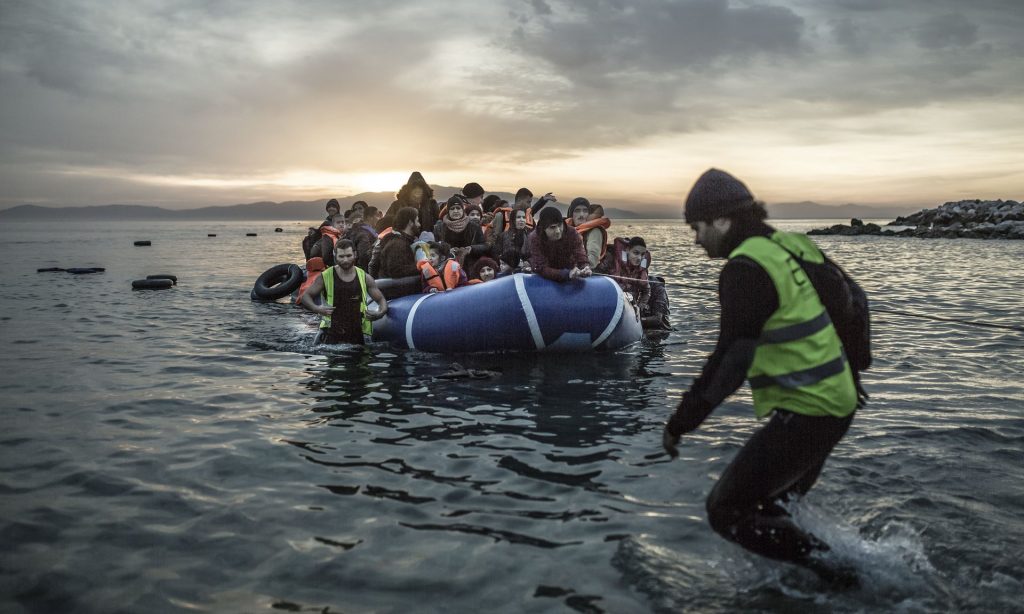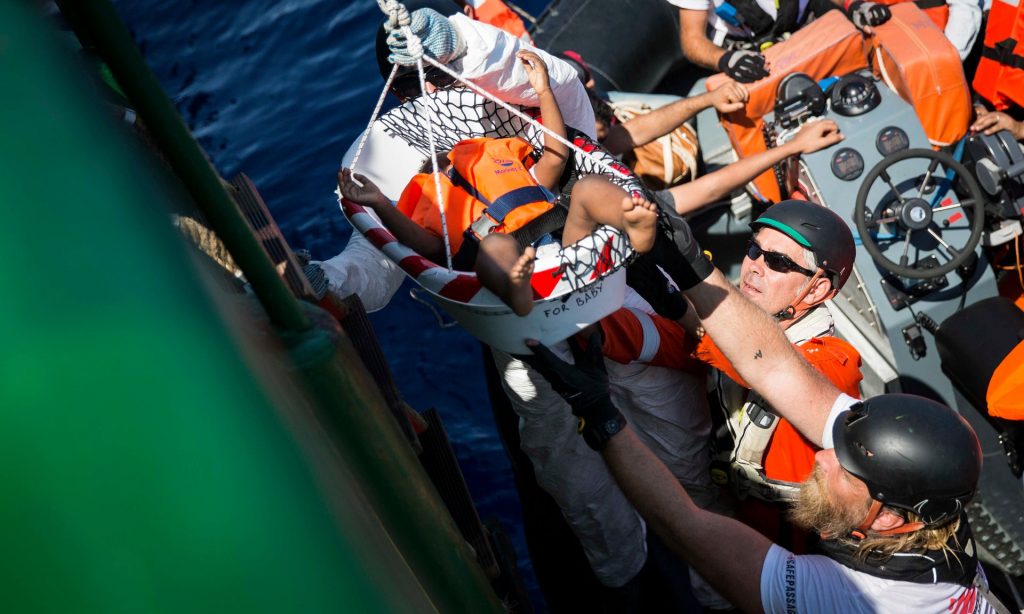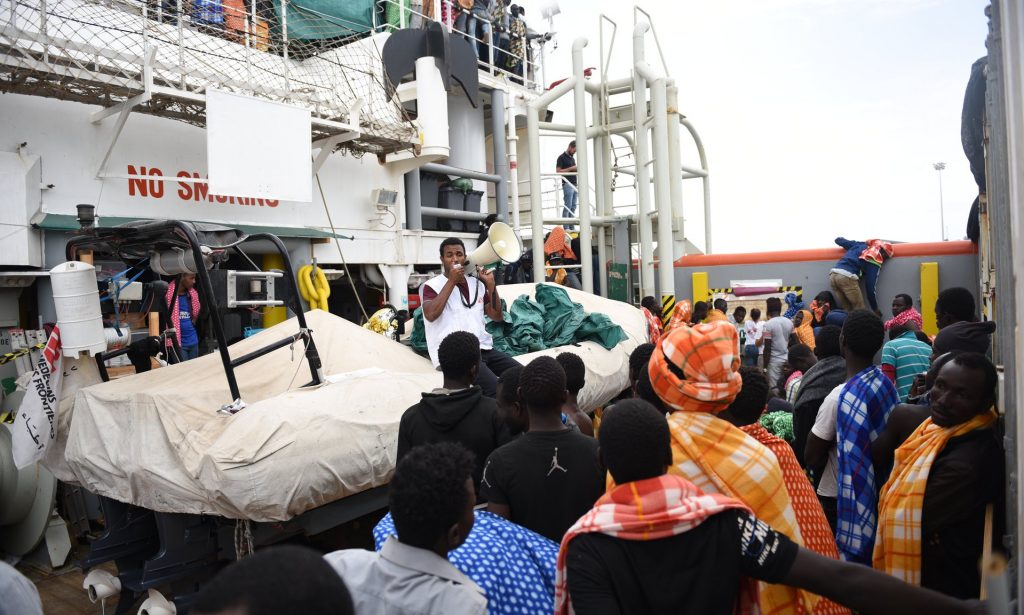
Photograph: Pablo Tosco/AP
It was the silence of the passengers that Hassiba Hadj-Sahraoui first noticed. Usually when the humanitarian rescue boat sees a tiny dinghy bobbing about in the Mediterranean there’s frantic waving and shouting. “When our team approached in smaller boats and everyone was so quiet we realised something was wrong,” she says. “We asked permission to go aboard and that’s when we realised the others had been waiting for rescue for hours with dead bodies in the boat.”
Twenty-two bodies were recovered that day (21 of them women) and 209 people were saved by the crew of the Aquarius, a boat run by Medicins Sans Frontieres (MSF) that patrols the refugee route between Libya and Italy. MSF advocacy manager Hadj-Sahraoui got an idea of how they died from the testimonies of survivors once they were safely on the Aquarius. A wooden board that had been placed along the bottom of the dinghy broke and water started to come in, mixing with leaking fuel cans. A panic ensued and the 22 people died either in a stampede or drowning in a mix of water and fuel.
The people they rescued were in shock. “The priority – it’s sad to say – is with the living,” says Hadj-Sahraoui. “So there’s a very quick medical team, trying to assess needs.” Once the survivors were on the Aquarius they were each given a blanket, water and some food. The people who were soaked in fuel were sent for a shower, because the fuel and sea salt cause nasty burns. Then they registered them.

Photograph: Andrew McConnell/Panos
Hadj-Sahraoui speaks Arabic, French and English, a great advantage in her line of work. She asks each person where they are from, how old they are, and if they are travelling alone. “We don’t wear sunglasses, because we need to have eye contact. It’s about humanity. It’s big smiles saying: ‘You’re now safe. This is where you are. This is what’s going to happen next.’ What surprised me is how polite people are. How they take their time to say thank you.”
Once all the survivors were safely on board, and being tended to, the crew of the Aquarius also felt it was right on this occasion to recover the bodies of the women and one man who died. “For several hours we tried to keep the living on one side of the boat. The bodies had spent hours in the water, so we were trying to protect the living from seeing that. The doctor took pictures for identification, because families will never know what happened to their loved ones.” When they reached the port in Sicily the Italian Red Cross were there, with coffins and flowers for every person who died.
“The tough MSF doctors who have been going from war to war cried because of the flowers,” says Hadj-Sahraoui. “I was one of the suckers who cried a lot.” She says that people who do humanitarian work need to learn to take care of themselves, because there’s a lot of emotional burnout. MSF staff have psychological debriefings before and after they go on missions, and after extreme experiences like this one.
“I’ve been doing this type of job for a long time now,” she says. “And you never get used to it – that is a good thing. It gives you that drive. Now I feel we need to tell this story.” She likes her job because there’s a balance of on-the-ground work, seeing what refugees go through, and advocating at high levels for better treatment.

Photograph: Sara Creta/MSF
She meets European policymakers, embassies, journalists, and directors of migrant detention centres to inform them about what she sees on the ground and to lobby for better conditions for refugees. She recently met with the members of the military who are carrying out the EU’s Operation Sophia, cracking down on smuggling networks across the Mediterranean. “So I went from wearing T-shirts to a very formal meeting with 10 military people, discussing the bigger picture,” she says. She also goes to international summits about migration – there’s one at the UN in September 2016.
As an advocacy manager, Hadj-Sahraoui’s job on the boat was to interview as many people as possible, to understand what happened, and to collect testimonies that she can use in her campaigning. “I collected a testimony from a woman who for the first day was just staring at the floor. Later she opened up and talked about fighting for her life, and how thankful she felt because it had been so close. And how she couldn’t help a pregnant woman and she had died.”
Those testimonies support MSF’s work campaigning for safe and legal ways for people to get to Europe. “We’ve had, since the beginning of the year, 3,000 die in the Mediterranean Sea trying to cross. And it’s so unnecessary. I think it’s important to remind people of the risks that migrants are taking in order to cross and the very high price they are paying.”
Some of the women Hadj-Sahraoui interviewed told her that they had been gang-raped in Libya for extended periods of time. “Some European countries are considering doing a deal with Libya to send refugees back there. I do think that governments need to be made aware of these things. Really sending women back to Libya would be sending them back to hell.”
Hadj-Sahraoui studied law and is an expert in the Middle East. She worked for Amnesty International for 10 years before joining MSF three months ago. “Having regional or country expertise makes you very valuable for the organisation. We’re not operating in a vacuum, we need to understand the context very well.”
Despite the organisation being called “doctors without borders” in English, people of all kinds of professional backgrounds work for MSF. She says: “You don’t have to be a doctor to work for MSF or for the humanitarian field. There’s a range of jobs. Doctors, nurses, psychologists, midwives (we did have a baby born on the boat), to logisticians – we need to provide food for hundreds of people, shower facilities, toilets. There’s engineers, architects, finance people, HR people.”
For those that are interested in a job like hers, Hadj-Sahraoui’s first piece of advice is to try: “When I was doing my training I met people who said ‘I always dreamed of doing something like this but I didn’t think I could’. MSF is quite open. They’re looking for a range of people.”
There’s also no set education or career path for this job. “It’s not the kind of job where you go ‘I’m going to study this and I’m going to go to that school, and that is my ticket for that kind of job’. There’s no school for this job, it’s about passion and commitment.”

